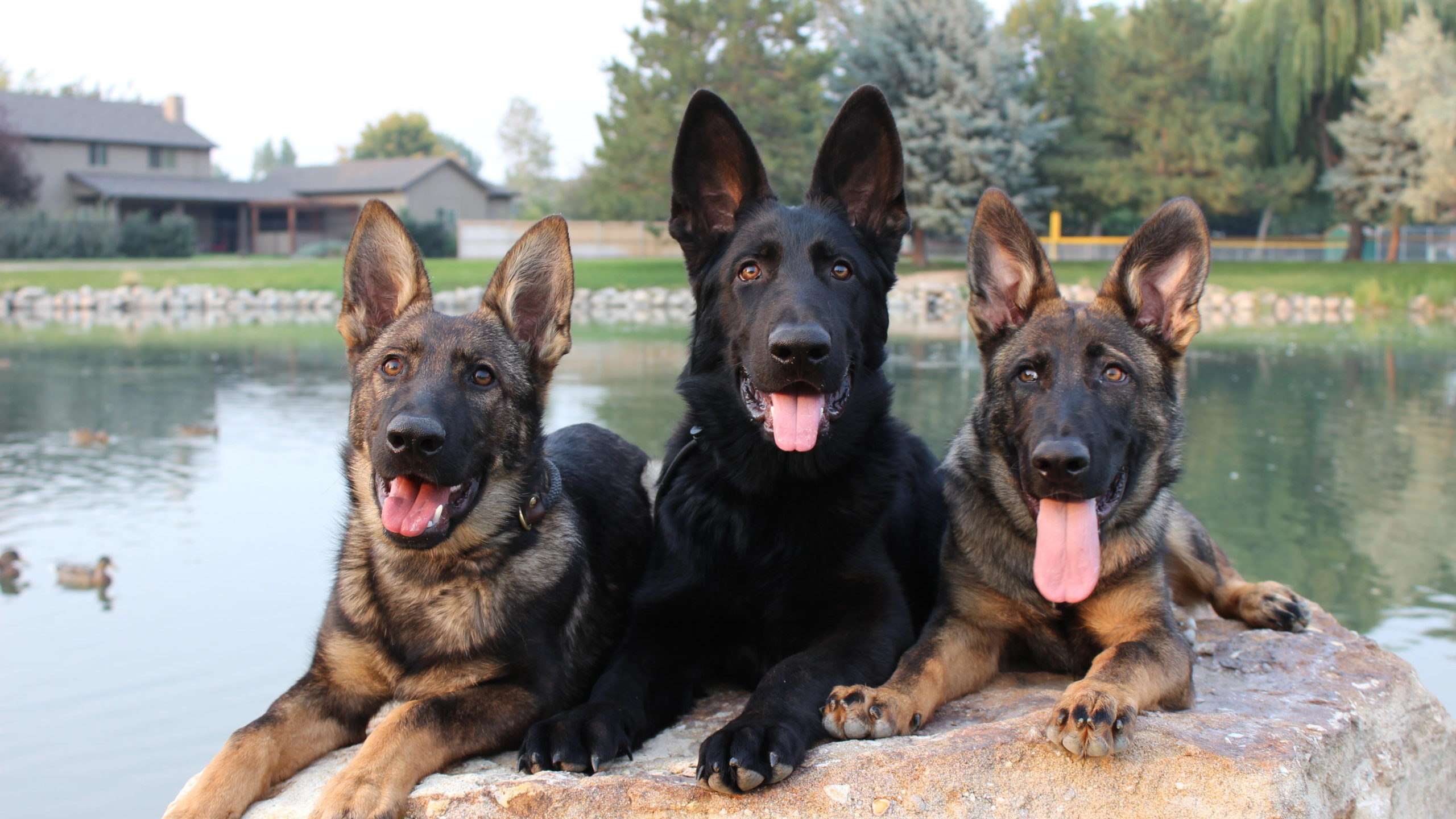If you are looking to buy a Family Protection Dog and you’re undecided between getting a male or a female dog, this article is for you. We specialize in Czech German Shepherds and have experience training thousands of dogs in our pet training business, so we can confidently highlight five important considerations for you. Let’s narrow down the similarities and differences so you can choose the best-fit protection dog for your home and family.
1. Size
Czech German Shepherds are bigger than standard shepherds. Fully mature, a male Czech Shepherd is 70-90 pounds and stands 24-26 inches at the shoulders/withers. Females, on the other hand, are typically 50-70 pounds and 22-24 inches at the withers.
All German Shepherds are intimidating-looking, especially when they are exposing their teeth and emitting a scary bark while lunging at a threat. But as a general rule, larger (and darker) dogs are more intimidating. Their size alone sends a strong message to potential intruders. Larger dogs, however, are typically less agile than their smaller female counterparts. A lumbering 85 pound male is going to have a harder time jumping a fence or launching through a window to take down an intruder than a lightweight female. Female German Shepherds are quick on their feet and can usually outrun males.
For reference, the fastest dog in my pack right now is Freya, our 61-pound 13-month-old female Czech Shepherd. She outruns all of the other dogs with ease. She’s extremely agile and can run laps around our equally athletic but 99-pound 7-year-old mature male, Havok. That said, when it comes to the intimidation factor, Havok takes the cake. People comment on his size everywhere we go, and most people cross the street when they see him coming.
If you like to travel and prefer traveling light, you might consider the advantages of a female protection dog. They’re compact, they shed less, eat less and fit easily into tight spaces.
2. Intelligence
When it comes to intelligence and our Czech German Shepherds, you’re comparing apples to apples. The breed is known for its remarkable intelligence, adaptability and versatility. That’s why we chose them specifically for our program. They’re perceptive and learn new concepts quickly. But, as professional dog trainers, we have noticed that females tend to mature more quickly and possess a higher level of intelligence. They require less repetition than their male counterparts to learn new skills and can easily recall those skills in the future. They are also more in-tune with their handlers than most males.
German Shepherd Protection Dog in-Training Freya is hands-down one of the most intelligent dogs I have ever trained in my lifetime. She learns at an extremely rapid pace and needs very little repetition to master a new skill or concept. For example, I was teaching her to “Pout” for a dog tricks title, where she lays down and rests her chin fully on the ground between her paws, and she was offering it after just 90 seconds of training. I’ve never had a dog catch on that quickly! Training her is a breeze.
Her intelligence is also, no doubt, genetic. Her mother, Gazella z Jirkova dvora, earned all of her working titles, to include the ZVV2, IGP2 and FPr3 among others, by the age of two. That’s incredibly impressive by any standard – male or female. (To learn more about the dog sport IGP, formerly called Schutzhund, click here: The Origin of the Sport.
3. Hormones
As professional dog trainers by trade, we would be remiss to not mention something about the role of hormones in male and female dogs. There is a stigma that intact male dogs are overtly dominant, aggressive and hard-to-handle because of their need to be “alpha.” This is not the case with our male dogs. None of our male dogs are dominant, pushy or aggressive. Why? Because they have good genetics and they’ve been raised right. They respect authority and understand their place in the pecking order.
Every single one of our dogs, both male and female, are easy going and enjoyable to live with. We picked lines that are known for being willing to work and eager to please their handlers, and we know how to raise dogs that are agreeable and pleasant.
The biggest role that hormones play in dogs is that sometimes intact male dogs do not get along. And by that we mean if you have an intact male you may be better off selecting a female counterpart for your family’s protection dog. This isn’t because our dogs are not capable of getting along with intact males – they absolutely are and do so on a daily basis – but more so that your intact male may not get along with another intact male. (Click here to see our intact dogs getting along beautifully.) Most intact male dogs in the general pet population have been insufficiently socialized or they have been allowed to be dominant towards other dogs and are unwelcoming of another male in their home and on their territory. So if your male is that way, to keep the peace, we would recommend a female in that situation (and some training for your male).
On the transverse, sometimes intact female dogs do not get along. Again, this is not an issue with our Czech Shepherds, as they have been abundantly socialized and get along well with *all* dogs. But intact females tend to feud with other intact females to establish dominance and hierarchy in the home. So if you have an intact female who is dominant or pushy, we wouldn’t recommend purchasing another female as that could be problematic. Our goal is to ensure a smooth transition of our dogs from our homes to yours.
Worth mentioning: We do not spay or neuter our dogs before they are sold. We believe strongly in the importance of hormones in helping dogs reach maturity physically and recommend waiting to fix dogs until they are two to three years of age. Leaving dogs intact until maturity also prevents a whole host of potential health issues.
4. Temperament
Along the lines of hormones but different enough to be its own category is temperament. Overall, our Family Protection Dogs have very similar temperament traits. They are confident, adaptable, loving towards family and friends, great with kids, great with other dogs and enjoyable to be around. They are all eager to please and want to work for their handler. We sought their specific bloodlines for a reason: They’re superior dogs in every sense of the word! They have all the right ingredients to be Dream Dogs.
That said, there are a few differences in the temperament traits of male and female dogs. In a broad sense, females tend to be more sensitive and less forgiving of mistakes. If you are unfair to a female dog or you lose your temper with her, she will likely shut down and avoid you. Females take things personally so when you break their trust, they make you earn it back. Their heightened sensitivity, however, makes them very easy to train and it means they generally require very few corrections as they are easy to control with voice-only.
Males on the other hand are easy-going and forgiving of mistakes and hot tempers. Like water on a duck’s back, it rolls right off them. They care, but they do not hold it against you and are happy to forgive and forget. They can tend to be a little hard-headed when it comes to corrections and sometimes need a more meaningful correction than a female would (for the same behavior). Both males and females thrive off leadership, consistency and fairness.
People will say that females bond better to men, and males get along better with women, but to be honest – in my nearly decade of dog training, and with my personal pack, I have not found that to necessarily be true. Females tend to do better with more patient people, whereas males get along with anyone but do require more leadership at times. All of the dogs in our pack, males and females, choose me as their ‘person’ (over my husband) because I spend more time with them and ‘good things’ come from me. (For more on bonding, read my article “Bonding with your new protection dog.”)
When it comes to temperament with kids, we have seen no differences between our male protection dogs and our female protection dogs. They’re all excellent with children: loving, patient, playful and protective.
5. Ability
Do not let size fool you. When it comes to ability there is no difference between males and females. Both sexes excel in protection training, obedience and general dog sports. In protection training, females tend to be quicker and more agile, but males are harder-hitting. Never underestimate a female dog when she’s fired up – she is a force to be reckoned with. All of our dogs are very protective and possess an equal level of ability when it comes to family protection and home protection.
We welcome buyers who seek to do extracurricular activities with their dogs, outside of obedience and manners upkeep at home – so if there is a specific dog sport you’re interested in let us know! We have invested a lot of time and effort into introducing our dogs to and titling our dogs in various dog sports. Tell us what you want to do, and we’ll pick the best-fit dog for you! All of our dogs are moderate drive and suitable for any sports venue.
Bottom Line
When it comes to choosing between a male and female family protection dog, we recommend taking size, intelligence, hormones, temperament and ability into consideration. What are you more drawn to? What matters the most to you? Maybe your Dream Dog isn’t a specific gender, and you have other requirements -other boxes to check – as to what makes your Dream Dog YOUR Dream Dog. You tell us, and we will help pair you with your perfect match! We have a variety of Top Tier, Fully-Trained Protection Dogs for Sale. View our current selection of Dogs for Sale. We have four male Czech German Shepherds available and three females. They are all exceptional dogs!



